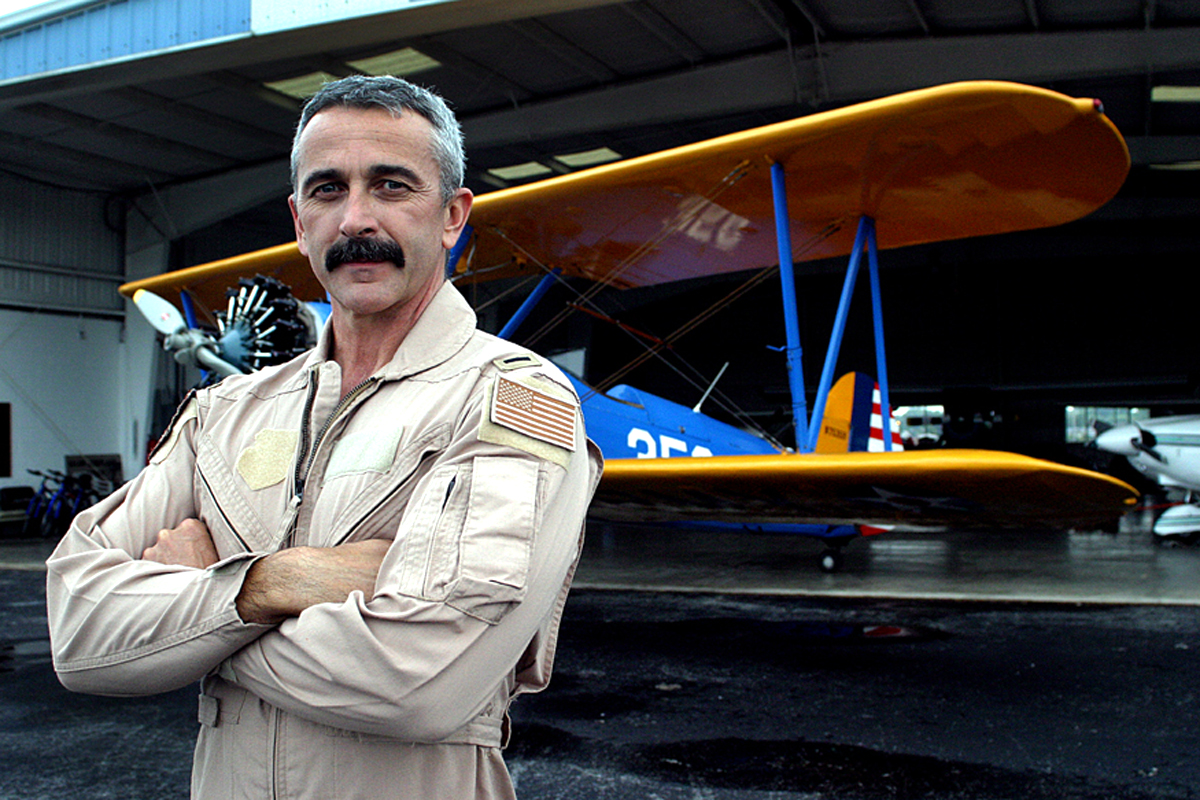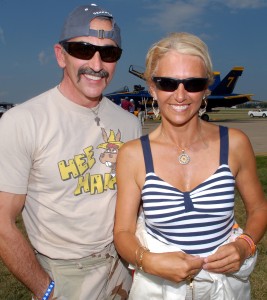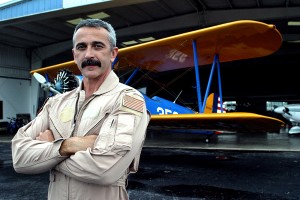
Aaron Tippin flies his Stearman in the “Ready to Rock (in a Country Kinda Way)” video. Currently, the pilot also owns a Cub, a Super Decathlon and a Helio Courier.
By Di Freeze and Clayton Moore
They say lightning doesn’t strike the same place twice, but try telling that to pilot, patriot and electrifying country star Aaron Tippin, who has firsthand experience.
Indirect lightning strikes twice zapped the future Nashville sensation when he was a child, working with his father and veteran pilot Willis “Tip” Tippin.
Tippin’s been lucky that all of his subsequent energizing experiences have been the ones he’s chosen, playing to millions of fans around the world who treasure his traditional yet exhilarating combination of roots-based country, old-time rock n’ roll and heartfelt patriotism. Since he hit the big time with his debut single, “You’ve Got to Stand for Something,” in 1991, commercial success has struck many times over for Tippin, resulting in three #1 singles, dozens of chart hits and sales of more than 6 million albums.
What some fans don’t know is that Tippin is a highly experienced pilot.
“Flying was my total goal in life,” Tippin recalled of his early career aspiration. “People in the music business are usually surprised to find out I started out being a professional pilot, not a country singer. I’m the least likely guy to succeed in this business.”
Growing up flying
Aaron Tippin wasn’t quite born on the Fourth of July, but he was close. He entered the world on July 3, 1958, right in the middle of America’s baby boom and the heyday of traditional rock n’ roll. Although he was born in Pensacola, Fla., Tippin was raised in rural South Carolina on his family’s farm near the town of Traveler’s Rest.
Willis Tippin had been a bush pilot, crop-duster and corporate pilot since serving as a Navy fighter pilot during World War II, dogfighting in the F4U Corsair. When his son was born, the flight instructor was training Air Force cadets in Bainbridge, Ga., in T-38s and T-37s.
“He flew a lot of airplanes,” Tippin recalled. “I was 4 years old the first time I ever put my hands on the controls of an airplane. It was a DC-3. I remember it like it was yesterday. We were flying along in cruise, and he asked me if I wanted to fly. He stacked every logbook he could find underneath my little butt and slid me up close so I could see the instrument panel. Then he let me put my hands on the wheel. That was it; I was hooked. I’ll never forget that moment.”
Tippin had a brother and two sisters, but he was the only one who dreamed about flying.
“They couldn’t give a flying flip about flying,” he said. “I was totally consumed with it. In fact, I tried to build an airplane in the backyard. My dad finally made me stop, because it looked like I was going to have something that might fly.”
His mother was another family member who was unenthusiastic about aviation.
“She always thought my dad was a little crazy,” he said.
After getting out of the service, Willis Tippin worked as a corporate pilot for companies including Liberty Life, Regal Textiles, Greenwood Mills and Stevens Beechcraft.
“He flew for many companies around the Greenville area while I was growing up,” Tippin recalled.
When Tippin was a teenager, his father took over the fixed base operation in Greenville. Tippin spent a lot of time at Greenville Downtown Airport (GMU), and by the age of 14, he was studying for his private license.
“My dad took me up in everything that had wings,” he said. “I had multi-engine time before I was a private pilot.”
With the goal of being an airline pilot, Tippin soloed at 16. By the age of 17, he was flying for his father, Stevens Beechcraft and other corporations in the area.
“I already had a multi-engine and was almost instrument rated,” Tippin said. “I had my instrument rating by the time I was 18. Dad would send me off to pick up new airplanes. I would fly down to the Piper factory in Florida, or all the way to Denver, to pick up an airplane he traded on. I got a lot of great experience, just me and a portable radio and a credit card. It was pretty cool for a 17-year-old.”
Tippin’s father had gained aerobatic experience from years of combat training, so he taught his son primary aerobatic maneuvers as well.
“He taught me to fly a Citabria,” Tippin said. “Later, we bought a Great Lakes biplane.”
That biplane brought about Tippin’s only narrow escape. When the engine started pouring out oil from a broken component, Tippin shut the engine down and glided to a perfect dead-stick landing at the local airport.
Along with the best practices of flight instruction, the elder Tippin also instilled a strong sense of God and country into his son.
“My dad was a big patriot,” Tippin said. “When you talk about Aaron Tippin’s patriotism, you’re talking about that part of my dad that’s in me.”
Tippin recalled that his father wasn’t big on voicing his affection, but Tippin still knew how he felt about his son.
“My dad was a great father,” Tippin said. “He was about that ‘tough love’ stuff. He never told me he loved me until I was in my mid-20s, but man, he loved me. I know, because every time he went to an airport, he always made sure to include me. He would be moonlighting or flight instructing, and when he couldn’t take me in the airplane, he’d leave me on the ramp. He’d say, ‘All right, Aaron, you stay here. I’ll be back in an hour.’ I’d hang out with the line guys.”
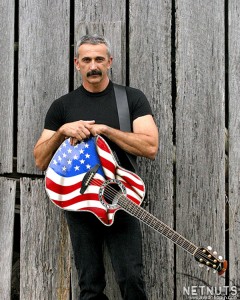
Aaron Tippin’s patriotism comes through loud and clear in his songs. “My dad was a big patriot,” he said. “When you talk about my patriotism, you’re talking about that part of my dad that’s in me.”
By the time he was 19, Tippin had logged more than 2,500 hours of flight time, was earning a decent living as a corporate pilot and was well on his way to earning his commercial airline transport rating. His path seemed set.
“Flying was absolutely out front,” Tippin said. “You could’ve offered me time in a Learjet or a date with Farrah Fawcett, and I’d take the Learjet every time. I was hooked on airplanes. I lived and breathed aviation. It was all I wanted to do.”
The energy crisis of the mid-1970s changed that.
“When I saw Delta furloughing senior captains, I thought, ‘Man, I’m not going to make it,'” he recalled. “I decided I’d do something that I liked next best. I thought I’d flown enough. I’d had the chance to do aerobatics and do the kinds of things that most folk don’t get a chance to do.”
Tippin didn’t even consider continuing as a corporate pilot or exploring another area of aviation.
“I might have been a spray pilot, if I would’ve been from someplace in South Georgia or Mississippi,” he said. “But I didn’t like being a corporate pilot. I didn’t like sitting there all day long, waiting on somebody. They might call you and tell you to go get a hotel room, after you sat there all day. Plenty of guys do that and probably better manage their off time than I did. I was a young guy. I wanted to go, go, go. I wanted to build flight time. It just didn’t look like it was going to be the future I wanted.”
In the late 1970s, Tippin said goodbye to the cockpit and his past dreams.
“I just dropped the towel and walked off,” he said.
Honky-tonk man
Willis Tippin provided his son inspiration in many areas, but not when it came to music.
“Dad couldn’t carry a tune in a bucket,” Tippin laughed. “They let him sing in the church choir, because they were too embarrassed to tell him he couldn’t. He was a sorry singer, but his heart was big.”
Tippin’s mother Mary bought him his first guitar lesson. He learned to warble a tune while operating a Ford tractor.
“We were part-time farmers,” Tippin said. “The hay rights were to Greenville Spartanburg (GSP), and you can imagine how much hay we baled out there. At 9, I was out there cutting hay, from the time the sun came up until the day was done and I was picked up.”
As he worked, he sang the popular country and pop songs of the day.
“I remember singing ‘Silver Wings,’ by Merle Haggard,” he said. “I sang that one because Eastern Airlines was a big operator at the airport, and I’d see its pilots land that 727. I couldn’t believe it had three engines!”
Influenced by legendary performers like Jimmie Rodgers, Hank Thompson and Lefty Frizzell, Tippin began playing guitar at the age of 10.
“I didn’t really appreciate guitar playing at that time,” he said.
Tippin was in high school when he really started enjoying music.
“I started hooking up with the bluegrass guys,” he said. “Somebody showed me how to play G, C and D and then said, ‘Now you can play a song.'”
While he was intent on flying, music was “strictly a minimal pastime.” During the time he flew for a living, up until the late 1970s, he spent much of his time off with his bluegrass friends.
“When I quit flying for a living, I said, ‘Let’s go pick the honkytonks,'” he recalled. “My friends said, ‘They won’t pay you.’ They didn’t want bluegrass back then; they wanted country music or rock ‘n roll. I was a big fan of country music, so I said, ‘Then let’s start a country band.’ I started playing shows on the weekends and eventually became a house band. I was playing five, six nights a week.”
While he spent his nights playing country tunes, Tippin worked hard during the day as a welder, roofer, heavy equipment operator, truck driver and farmhand, often picking up other blue-collar jobs to get by.
“Being a farm kid is pretty good, because you get a lot of experience in a lot of different things in life,” he laughed.
In 1986, Tippin competed on the television program, “You Can Be a Star,” featured on the Nashville Network.
“It was strictly about being a singer,” Tippin said of the program. “I was a songwriter, and I performed songs that I had written.”
He won a daily contest, but when he lost the weekly show, he thought, “Well, that’s it. I didn’t do too well.”
One of the judges disagreed. Jeannie C. Reilly had seen star quality in the songwriter.
“She came to me afterwards and said, ‘Aaron, I know you didn’t win, but you ought to think about being in this business. You have a unique sound, and your song was good. You could make it in this town,'” he recalled. “I went home, quit my job and came back.”
Once he’d moved to Nashville, Tenn., Tippin followed the working-class values instilled by his father and worked the midnight shift at Logan Aluminum in Kentucky. He then turned around each morning and drove 60 miles to Music Row, where he spent his days at the legendary Acuff-Rose publishing firm, writing songs for artists like The Kingsmen and Charley Pride.
Along with his heartfelt songwriting, Tippin also found time to pursue a sideline as an amateur bodybuilder.
“I really got into lifting weights after I came to Nashville,” Tippin said. “Becoming ‘a star’ wasn’t working out. I enjoyed the songwriter lifestyle, which allowed me time to work out. I would go to the gym at 6 in the morning, write songs all day, go back to the gym at 3 and then go home and go to bed. I guess I decided I wanted to live past 30—quit drinking so much and start getting into shape.”
It was a healthy lifestyle, but any country singer can tell you that Nashville can be a lonely place. Tippin, who first started singing in public by joining his church choir, turned to faith to fill the void.
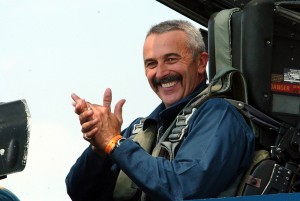
Aaron Tippin flew with the Blue Angels during AirVenture 2006. He’s also participated in a USAF Thunderbirds flight; flying 9-Gs in an F-16 earned him a special 9-G pin.
“I really got close to Christ when I was in Nashville by myself,” he remembered. “I had friends, but nobody from my family was up there. It wasn’t the same as being around the people you love. That’s when I realized that the best friend I really had was there and had been there the whole time.”
Stars and Stripes
Tippin’s hard work paid off after he started pitching his demo tape to record companies.
“I didn’t have a lot of money back then, so I’d have to sing my own demos,” he said. “Finally, somebody at RCA said, ‘Who’s this guy singing this demo? It’s different.’ They started asking questions, and then they called my publishing company, found out who I was and asked me to come over and sing a few songs for them.”
Tippin played his first showcase at a Nashville club in 1990. His dynamic performance earned him a contract with RCA records. His 1991 debut album, “You’ve Got to Stand for Something,” yielded three hits on the U.S. country charts, including the title track that became a top 10 smash. Its patriotic tone resonated with a nation engaged in the first Gulf War.
Tippin said his father inspired “You’ve Got to Stand for Something.” He would also inspire the lyrics for “Working Man’s PhD,” “I Got it Honest” and many other songs.
“My dad’s responsible for a lot of the music that I put out,” he said. “He gave me the fuel to help me accomplish whatever I needed to in life.”
Over the next four years, Tippin toured with a cavalcade of country stars, including Brooks & Dunn, Reba McEntire and Hank Williams Jr. In 1990, he went to the Persian Gulf to entertain troops.
“I went with Bob Hope; it was his last combat tour and my first,” Tippin recalled. “I’m a strong supporter of our troops.”
In 2002, he went to Afghanistan. He’s been making annual visits to Iraq each year since 2003.
“I just want to make sure they know they’re loved and appreciated,” he said. He recently became the spokesman for the Paralyzed Veterans of America.
Throughout the last decade, Tippin played before more than a million fans each year, many of them dressed in hard hats and overalls, proudly embracing their own blue-collar roots. He kept cutting hit records as well. His second album, 1992’s “Read Between the Lines,” brought the top 10 singles “I Wouldn’t Have it Any Other Way” and “My Blue Angel,” as well as his first number one hit, “There Ain’t Nothing Wrong With the Radio.” Subsequent albums showed a rough-and-tumble side of the artist, with songs like “Honky-Tonk Superman” and “Working Man’s PhD.”
“Some people have said I’ve changed my style, but if you listen to some of my songs, you’ll find they’re more rockin’ than people remember,” Tippin said. “I did ‘Working Man’s PhD’ in ’92, and it’s a rockin’ little song.”
1995 found Tippin back on the charts with a romantic number, “That’s as Close as I’ll Get to Loving You.” Tippin had experienced his first big romance two decades earlier; at the age of 17, he made a trip to the altar. The marriage lasted less than five years, but resulted in one very bright spot—the birth of his daughter Charla.
On July 15, 1995, the singer married Thea Corontzos. They welcomed a son, Theo Emory, in 1997, and his brother, Thomas Aaron, in 2000.
Tippin signed with Disney’s Lyric Street Records in 1998 and charted with back-to-back hits “For You I Will” and “I’m Leaving,” from the album “What This Country Needs.” As the new millennium began, he started stretching his creative muscle.
Some of his best writing emerged in the past decade. 2000’s “People Like Us” featured a number one smash hit, “Kiss This,” co-written with his wife. 2002’s “Stars & Stripes,” a post-Sept. 11 album, struck a chord once more with an apprehensive nation. Fans across the country pushed Tippin’s powerful song, “Where the Stars and Stripes and the Eagle Fly,” to number two on the country charts; it also cracked the top 20 on the pop chart. Tippin donated the single’s proceeds to the local American Red Cross chapter’s Disaster Relief Fund. The song remains his most requested.
“Country fans went out and bought the record to help other Americans who needed help at the time,” Tippin said. “That’s what real country fans are like.”
In 2005, Tippin was the first country artist to donate funds to the victims of Hurricane Katrina. Each time he sang “Where the Stars and Stripes and the Eagle Fly” at a concert, the singer would send out five-gallon buckets with the word “Katrina” painted on them. They always came back to the stage overflowing with generosity.
Calling the shots
Tippin recently formed his own record label, Nippit Records—that’s “Tippin” backwards—as a partnership with Rust Records in Nashville. His latest disc, “Now and Then,” provides a dramatic introduction to the breadth of Tippin’s work, as well as a poignant recollection for longtime fans.
“My voice has changed; it’s fuller and more mature,” he said. “So I went back and rerecorded the old songs.”
He did the work in a converted storefront formerly occupied by his now defunct hunting supply store. The 10 rerecorded hits include “I’m Ready to Rock,” “Honky-Tonk Superman” and “Working Man’s PhD.”
“The way I do a song now, after 16 years have passed, is very different,” he said. “The guys and gals that come to an Aaron Tippin show are more familiar with these songs than the original versions.”
He added three brand new songs, including “Could Not Stop Myself” and “He Believed,” a song that pays tribute once more to Willis Tippin, who passed away in 2005.
“I’ve got to credit Thea for that song,” he said. “We were coming back from his funeral and she said, ‘We need to write a song about your dad, because he was such a special guy.’ I said, ‘Honey, I’ve written every song I can write about my dad. There’s nothing left to write.’ She said, ‘After being around the people that knew your dad, I’ve realized that the greatest thing about him was that he was such a believer.’ Once he believed in somebody, that was it.”
Tippin has received a lot of praise for that song and for others that have inspired his listeners.
“I appreciate it, because that’s exactly what we intend when Thea and I sit down to write songs,” Tippin said. “I want the listener to go, ‘That’s me. That’s how I feel.'”
Thea recently began recording a gospel album, and Tippin is working on a bluegrass album, due out next summer. A back-to-basics approach has brought many of the singer’s early Carolina influences into his music, bringing him even closer to capturing the working-class soul.
“I’m going back to my roots,” Tippin said. “It’s more about me being totally in charge of the music. No record executives are breathing down my neck, making sure we don’t do too much of this or that, or wondering if a song will be played on the radio. When we go to the studio, it’s only me and the players who decide how the music should turn out. That’s the way it should be—uncorrupted.”
Now that he has his own label, Tippin says he’s also calling the shots on what’s done—or not done—in videos. Recent videos reflect a return to his first love.
“I’m including a plane in almost every single video,” he said.
Tippin became involved in aviation again in the mid-1990s.
“I thought I didn’t care about flying anymore, but then I got to noticing that I was looking up every time an airplane flew over,” he said. “I used to be able to tell what kind of airplane it was, just by the sound, but I realized I couldn’t do that anymore. I realized I hadn’t gotten enough of flying. I still loved it.”
One day, the man who ran the local airport recognized Tippin at a hardware store.
“He said, ‘Aaron, didn’t you used to fly?'” Tippin recalled. “I said, ‘Yeah, I did.’ He said, ‘You ought to come out and get current.’ I said, ‘I might do that.’ Sure enough, I went up there, got a biannual flight review and started back flying.”
The encounter resulted eventually in Tippin buying a Great Lakes biplane.
“I went up to Massachusetts and bought it,” he said. “I thought it was factory-built, but once I got up there, I realized it was a homebuilt aircraft. I still bought it, and I flew it out of there. That taught me a good lesson.”
Tippin no longer has that airplane, but since then, he’s owned a Super Decathlon, two J-3 Cubs, two Cessna 185s, a Cessna 150 and 172, a Stearman, a Chipmunk and a Wilga (a short takeoff and land aircraft). He’s also a helicopter pilot and once owned a Bell 206 JetRanger.
Tippin’s spacious log home sits on more than 300 acres of forest near Nashville. The property includes a well-used 2,000-foot grass landing strip and a modest hangar.
“It’s great,” he said. “I’m done with that airport headache stuff. I don’t have to listen to any of that griping at the airport anymore. I love it.
These days, Tippin’s airplane collection includes his Stearman, a Cub, a new Super Decathlon and a Helio Courier he recently acquired.
“It’s a short takeoff and landing aircraft—single engine,” he said. “It has awesome performance. It’s a great little airplane for the family. My dad flew one when I was a kid. I knew it was an incredible performer, but I just never realized how great it was until I got my hands on one. He let me fly it five or six hours when I was growing up.
Tippin’s shown flying his Stearman in the video for “Ready to Rock (in a Country Kinda Way).”
“It was a lot of fun doing that video,” he said.
The video for ‘He Believed” was filmed at Upper Cumberland Regional Airport in Sparta, Tenn., and stars Tippin’s son Teddy as “young Aaron,” flying across the distinctive American landscape. Both of Tippin’s sons love to fly.
“I dropped a buddy off in the Helio earlier, and Tommy flew it back from a little airport,” he recalled. “Teddy can take off in the Cub. He’s just getting to where he can reach the rudder pedals. He’s getting close to landing.”
You’ll see a T-28, Yak and T-3 in the video for “He Believed.”
“They all belong to friends of mine who were nice enough to bring their airplanes out to help me with the video,” he said.
In “Blue Angel,” you’ll see Aaron flying an F-18 in the company of the Blue Angels, the Navy flight demonstration team. His interest in airplanes also led to a chance to join in a USAF Thunderbirds flight; flying 9-Gs in an F-16 earned Tippin a special 9-G pin.
Tippin can often be found at EAA AirVenture Oshkosh and Sun & Fun. His schedule hasn’t permitted him to fly in to AirVenture.
“I’ve usually got to be at a show, so I don’t get to stay the full week,” he said. “I have to fly the airlines in or have the boys drop me off of the bus. But I did fly into Sun ‘n Fun this year.”
He described his first trip to the Reno Air Races in 2006 as “awesome.” He admits that he has thought about racing, but doesn’t think it’s anything he’ll take up.
“That’s touchy business,” he said. “You better know what you’re doing, work hard and be great at it, because, boy, that close to the ground and in that choppy air, things can go wrong fast.”
Despite his experience “almost” building a flyable aircraft as a youth, Tippin says he hasn’t gotten into the homebuilt area.
“I’m a big fan of homebuilts, but I haven’t had the chance to get into that,” he said. “One of my goals is to build a plane totally from scratch with my uncle Billy (B.T.). I look forward to doing that someday—maybe in my retirement years.”
For more information on the life and music of Aaron Tippin, visit his official website at [http://aarontippin.musiccitynetworks.com].











